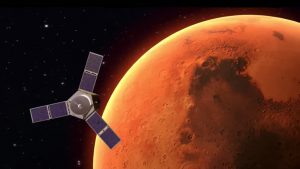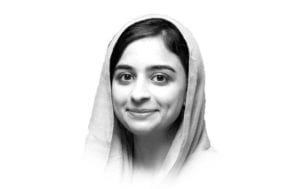by Arhama Siddiqa, Research Fellow at Institute of Strategic Studies, Islamabad

On July 19, the UAE successfully launched the first Arab mission to Mars — plans for which were first announced in 2014. The Al Amal (Hope) probe is expected to reach the red planet in February 2021, and its arrival into ‘Martian’ orbit has been timed to correspond with UAE’s 50th anniversary as an independent country (December 2021).
The designing of a space program is a pursuit through which the Emirates hopes to decamp reliance on oil and to further develop a footing in the arena of science and technology. The country has even pledged to build the first human settlement on Mars by 2117.
Israel was the first to set up a space program in the Middle East in 1983. Iran in 2004, was the second space state in the region. The UAE’s cosmic ambitions have not gone undetected. In 2018, both Saudi Arabia and Turkey established space commissions within days of each other. Egypt soon followed by setting up a space agency in 2019. To make the most of what seemed like a frenzied race, the UAE established the first pan-Arab Space Coordination Group in 2019.
Mohammad bin Zayed (also known as MBZ) has an assertive foreign policy stance that evolved from a conservative to a risk-taking approach. It has also accentuated the various personalities which have shaped decision-making in this seven-member federation led by Abu Dhabi. The UAE approach embeds economic openness, strong leadership and a relatively secular social milieu amidst a closed political system which is based around an entrenched security state.
The Emirates growing strategic interests encompass not only the Middle East but also include the wider neighborhood comprising of North Africa and the waterways of the Gulf of Suez, the Red Sea, the Bab al Mandeb Strait, the Gulf of Aden, the Strait of Hormuz, and the wider Arabian Sea. The UAE has also established military and economic positions in Mukalla, Aden and Mokha (Yemen), Bossaso (Puntland/Somalia), Berbera (Somaliland/ Somalia) and Assab (Eritrea) ports. China’s Belt and Road Initiative has already arrived in the Emirates in the form of a $300 million investment in the Khalifa Port in 2017.
Empty buildings and grounded Emirates flights indicated how Covid-19 had effectively put brakes on the world’s fastest city. Though the Emirates was among the first countries to open up again, recovery and recuperation will take its time. A survey in May, undertaken by the Dubai Chamber of Commerce, showed that 75% of the businesses surveyed were expected to close within the next six months.
In July, president of the Emirates air carrier lamented that a further 15% of his staff (9,000 employees) would have to be laid off. Dubai’s debt burden stands at $135 billion which is 125% of the country’s GDP. UAE’s Central Bank anticipates the non-oil economy to contract by 4.1% this year before there can be any semblance of a gradual recovery.
However, there is a glimmer of hope that improving sentiment and preparation for the Dubai Expo in 2021 will likely moderate the projected recovery. Furthermore, according to Dr Thani bin Ahmed Al Zeyoudi, the Minister of Climate Change and Environment, UAE’s renewables sector has been resilient throughout the pandemic and the country remains on track to meet its 2050 Energy Strategy goals of clean energy.
Moreover, on August 1, start-up operations in the preliminary unit of UAE’s first nuclear power plant (Barakah nuclear power plant) commenced. Hence, rightly called “Little Sparta” by the former US secretary of defense, Jim Mattis, the UAE leadership won’t allow their plans to fall through without a fight — a testament to what is said to be the Emirates unquenchable spirit.

Arhama Siddiqa is a Research Fellow at the Institute of Strategic Studies, Islamabad, Pakistan. She graduated from the Lahore University of Management Sciences (LUMS) in 2013 with a B.Sc. (Hons) in Political Science and Economics and went on to complete an MA in International Political Economy from the University of Warwick in 2014. Her research interests focus primarily on the Middle East, the role of major powers in South Asian politics, and the Kashmir dispute. She regularly contributes to publications such as The Pakistan Observer, Daily Times, and The Nation and has also written articles for HILAL. She was a 2017 Commonwealth Fellow at Conciliation Resources in the United Kingdom.
This article is republished with permission from The Express Tribune, where it was published first on August 5th, 2020. The original can be accessed here.


